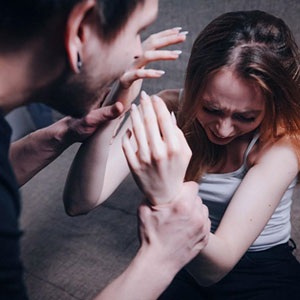 Having a grasp on the intricate landscape surrounding domestic violence charges in Virginia is critical if you find yourself in a position where you need to navigate it. In this article, we aim to help you acquire the knowledge necessary to do so. We explore:
Having a grasp on the intricate landscape surrounding domestic violence charges in Virginia is critical if you find yourself in a position where you need to navigate it. In this article, we aim to help you acquire the knowledge necessary to do so. We explore:
- Potential penalties, including fines of up to $2,500 and imprisonment for up to 12 months.
- Protective orders relevant to instances of domestic violence.
- Defense strategies commonly employed in domestic violence cases.
How Does Virginia State Law Define “Domestic Violence”?
In Virginia, domestic violence is a particular form of assault and battery, encompassing acts of physical harm, the menacing threat of assault, or offensive physical contact. What is unique to domestic violence is that it occurs within the context of a family or household relationship.
Virginia defines these relationships as those with immediate family members, including parents, siblings, or spouses, or individuals with whom you have shared a living arrangement in the past 12 months. These connections not only invoke charges of simple assault but also trigger specific charges of domestic assault under Virginia’s code section 18.2-57.2.
I Was Arrested In Virginia On Domestic Violence-Related Charges. What Specific Charge Do I Face And What Penalties Can I Expect If Convicted?
Domestic violence charges in Virginia carry with them relatively strict penalties. Associated penalties are outlined in Virginia statute code section 18.2-57.2. The state deems domestic violence a Class One misdemeanor, resulting in a maximum penalty of up to a $2,500 fine and up to 12 months in jail. This penalty applies regardless of whether the assault and battery occurred with a family or household member.
Is An Order Of Protection Automatically Issued When Someone Is Charged With A Domestic Violence-Related Offense?
An order of protection, more commonly known as a restraining order, is not necessarily automatically issued in response to a domestic violence-related offense having occurred. Typically, when an individual is charged with assault or domestic assault, the police officer that responds to the call will assess the situation to determine who the primary aggressor is. This individual is the person who initiated the physical contact, is deemed most responsible, and will face charges.
In certain instances, an emergency protective order may be issued when the primary aggressor is charged. If so, it prohibits the primary aggressor from contacting the complainant for 72 hours. Following this initial period, a preliminary protective order may be issued, extending the protection for up to 15 days. While not automatic, protective orders are generally issued when domestic assault charges are brought against someone.
What Happens If An Alleged Victim Changes Their Story After Domestic Violence-Related Charges Have Been Filed In Virginia?
If an alleged victim changes their story, what will happen hinges on how they change their story. If the victim denies that the assault or any form of threat or physical contact ever took place, it significantly weakens the prosecutor’s case and increases the likelihood of dismissal.
At times, prosecutors may confront victims with their initial written statements, questioning why they now contradict their own accounts. They may aim to challenge the witness’s credibility and encourage them to stick to their original version of events.
However, the charges will probably be dropped if the person remains steadfast in changing their story. Nonetheless, there is a possibility that a victim who retracts their statement could face charges for filing a false police report, although this does not always occur in such situations.
What Happens If I Am Convicted Of A Domestic Violence Charge?
Domestic violence convictions in Virginia carry substantial consequences. Not only do those convicted face the possibility of a $2,500 fine and a jail sentence, but they also encounter additional restrictions. One significant consequence is the prohibition of possessing or purchasing a firearm.
What Are Potential Defenses In Domestic Violence-Related Cases? Is Self-Defense A Viable Defense? How Does The Prosecution Prove Fault?
In domestic violence cases, self-defense often emerges as a viable defense strategy. This depends on various factors, including who initiated the physical contact, the nature of the preceding argument, and how the altercation unfolded. If the victim struck the person charged first, leading to a back-and-forth exchange, it forms the foundation for a self-defense claim. In situations where both parties engaged in simultaneous fighting, a defense known as mutual combat may come into play, potentially negating the guilt of the person charged by demonstrating shared involvement rather than a one-sided assault.
The prosecution weighs statements made by the individuals involved when determining fault. Admissions of initiating physical contact, for instance, can be used against them in court. Furthermore, the prosecution assesses the injuries sustained by each party. If the victim bears significant injuries while the defendant has minimal or no injuries, it can be presented as evidence to challenge the credibility of the defendant’s self-defense claim. Testimony from other witnesses present during the incident may also be summoned to support the prosecution’s case.
For more information on Domestic Violence Charges In Virginia, a free initial consultation is your next best step. Get the information and legal answers you are seeking by calling (804) 621-0854 today.